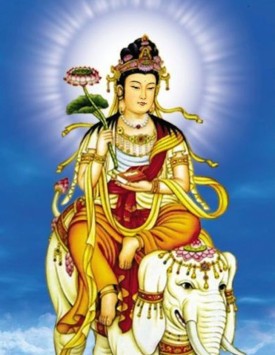[Chinese: 普賢菩薩 Pǔxián Púsà; Japanese: Fugen Bosatsu; Korean: 보현 Bohyeon Bosai; Vietnamese: Phổ Hiền Bo Tat; Tibetan: ཀུན་ཏུ་བཟང་པོ, Küntu Zangpo, Mongolian: Хамгаар Сайн], Universal Worthy/Virtue or Universal Kindness or Great Conduct Bodhisattva, is associated with practice and meditation. Together with the Buddha and Mañjuśrī, he sometimes forms the Shakyamuni trinity in Buddhism. He is the patron of the Lotus Sutra and, according to the Avatamsaka Sutra, made the ten great vows which are the basis of a Bodhisattva. In China, Samantabhadra is associated with action, whereas Mañjuśrī is associated with prajñā. In Japan, Samantabharda is often venerated by the Tendai and in Shingon Buddhism, and as the protector of the Lotus Sutra by Nichiren Buddhism.
In the Āvataṃsaka-sūtra, the Buddha states that Samantabhadra Bodhisattva made ten great vows on his path to full Buddhahood:
- To pay homage and respect to all Buddhas.
- To praise the Thus Come One-Tathagata.
- To make abundant offerings. (i.e. give generously)
- To repent misdeeds and evil karmas.
- To rejoice in others’ merits and virtues.
- To request the Buddhas to continue teaching.
- To request the Buddhas to remain in the world.
- To follow the teachings of the Buddhas at all times.
- To accommodate and benefit all living beings.
- To transfer all merits and virtues to benefit all beings.
The ten vows have become a common practice in East Asian Buddhism, particularly the tenth vow, with many Buddhists traditionally dedicating their merit and good works to all beings during Buddhist liturgies

